UK Entrepreneurship and Economic Growth
VerifiedAdded on 2020/06/05
|16
|4396
|132
AI Summary
This assignment examines entrepreneurship in the UK, analyzing its role in public and private ventures. It differentiates between serial and lifestyle entrepreneurs and explores the impact of micro, small, and medium enterprises (MSMEs) on the UK economy post-Brexit. The assignment also delves into essential entrepreneurial traits and personality characteristics using the OCEAN approach.
Contribute Materials
Your contribution can guide someone’s learning journey. Share your
documents today.
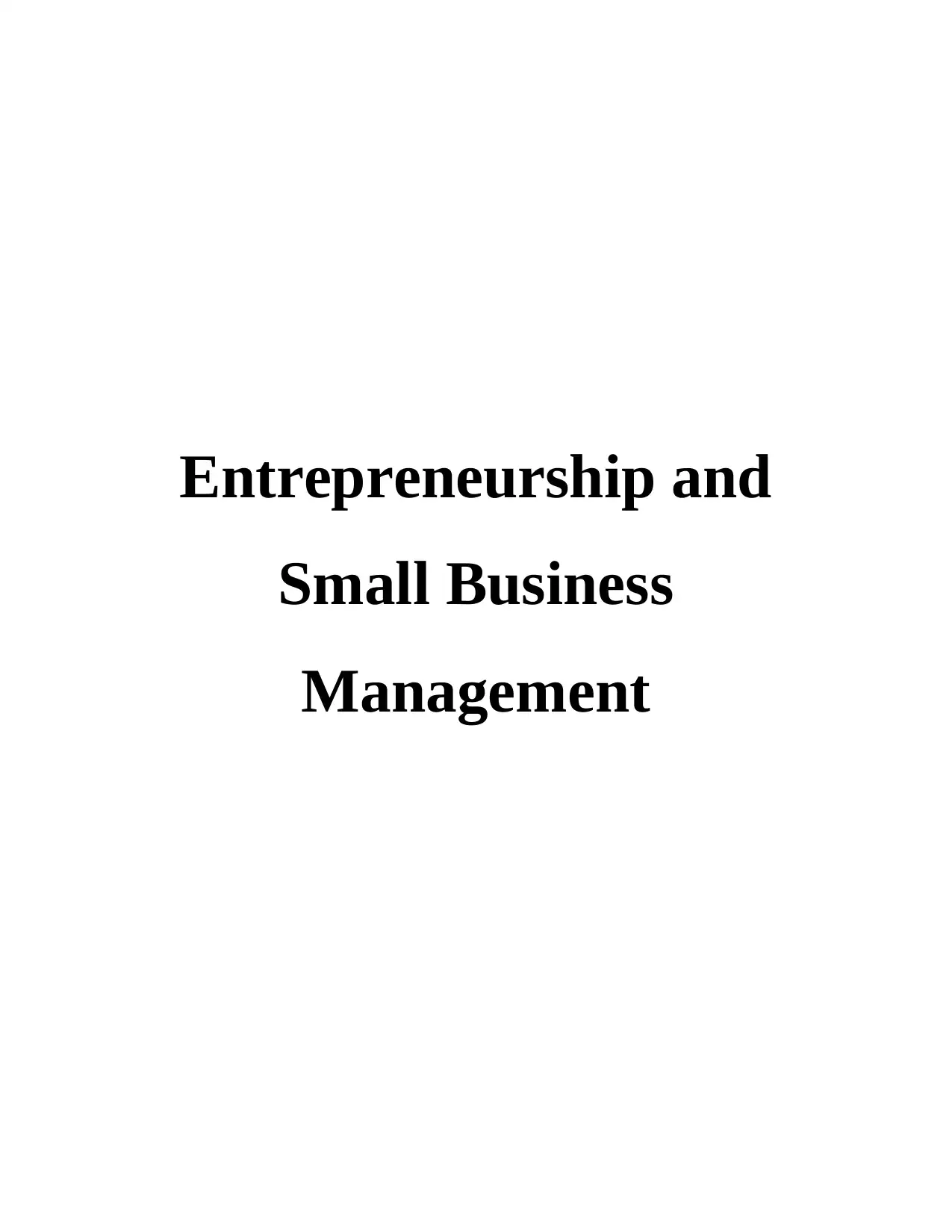
Entrepreneurship and
Small Business
Management
Small Business
Management
Secure Best Marks with AI Grader
Need help grading? Try our AI Grader for instant feedback on your assignments.
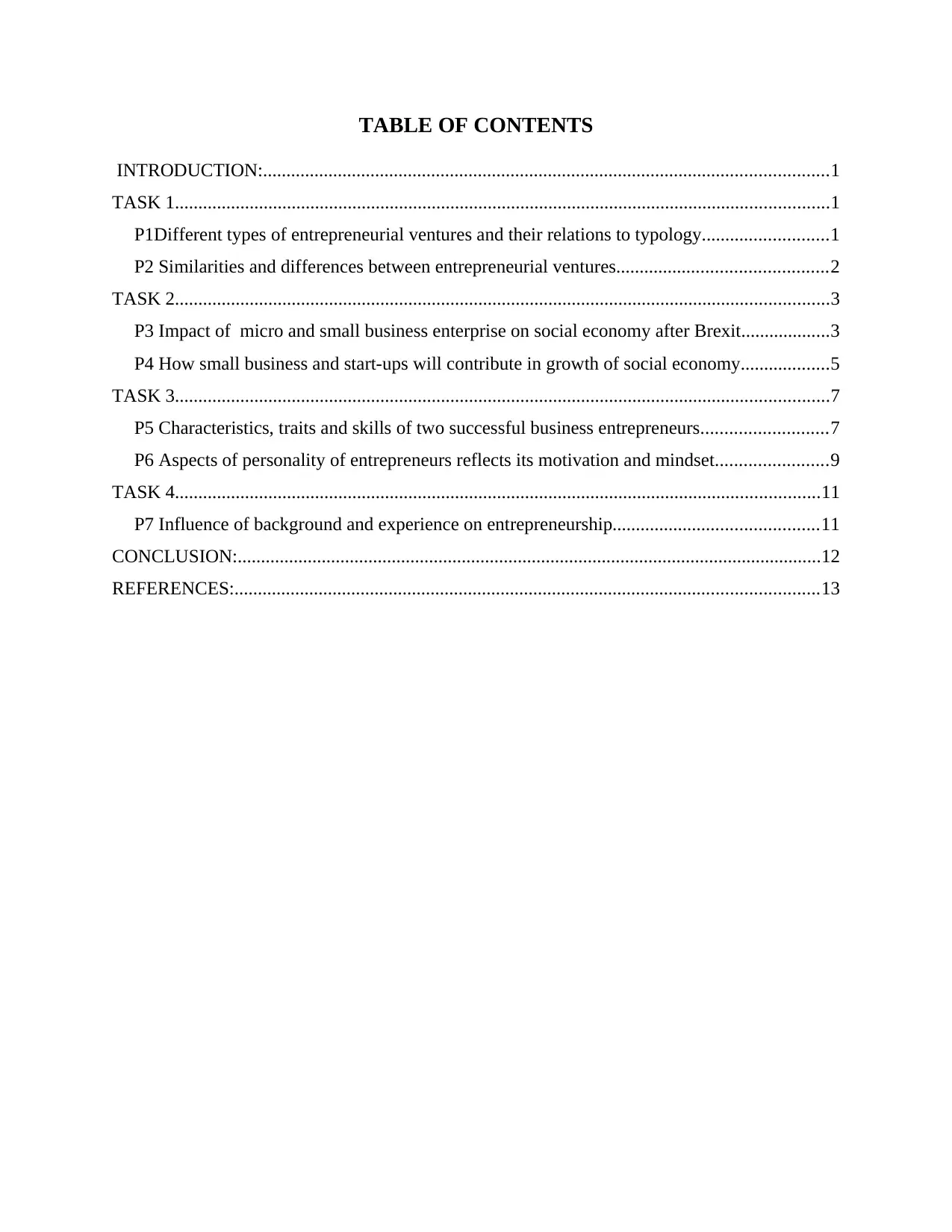
TABLE OF CONTENTS
INTRODUCTION:.........................................................................................................................1
TASK 1............................................................................................................................................1
P1Different types of entrepreneurial ventures and their relations to typology...........................1
P2 Similarities and differences between entrepreneurial ventures.............................................2
TASK 2............................................................................................................................................3
P3 Impact of micro and small business enterprise on social economy after Brexit...................3
P4 How small business and start-ups will contribute in growth of social economy...................5
TASK 3............................................................................................................................................7
P5 Characteristics, traits and skills of two successful business entrepreneurs...........................7
P6 Aspects of personality of entrepreneurs reflects its motivation and mindset........................9
TASK 4..........................................................................................................................................11
P7 Influence of background and experience on entrepreneurship............................................11
CONCLUSION:.............................................................................................................................12
REFERENCES:.............................................................................................................................13
INTRODUCTION:.........................................................................................................................1
TASK 1............................................................................................................................................1
P1Different types of entrepreneurial ventures and their relations to typology...........................1
P2 Similarities and differences between entrepreneurial ventures.............................................2
TASK 2............................................................................................................................................3
P3 Impact of micro and small business enterprise on social economy after Brexit...................3
P4 How small business and start-ups will contribute in growth of social economy...................5
TASK 3............................................................................................................................................7
P5 Characteristics, traits and skills of two successful business entrepreneurs...........................7
P6 Aspects of personality of entrepreneurs reflects its motivation and mindset........................9
TASK 4..........................................................................................................................................11
P7 Influence of background and experience on entrepreneurship............................................11
CONCLUSION:.............................................................................................................................12
REFERENCES:.............................................................................................................................13
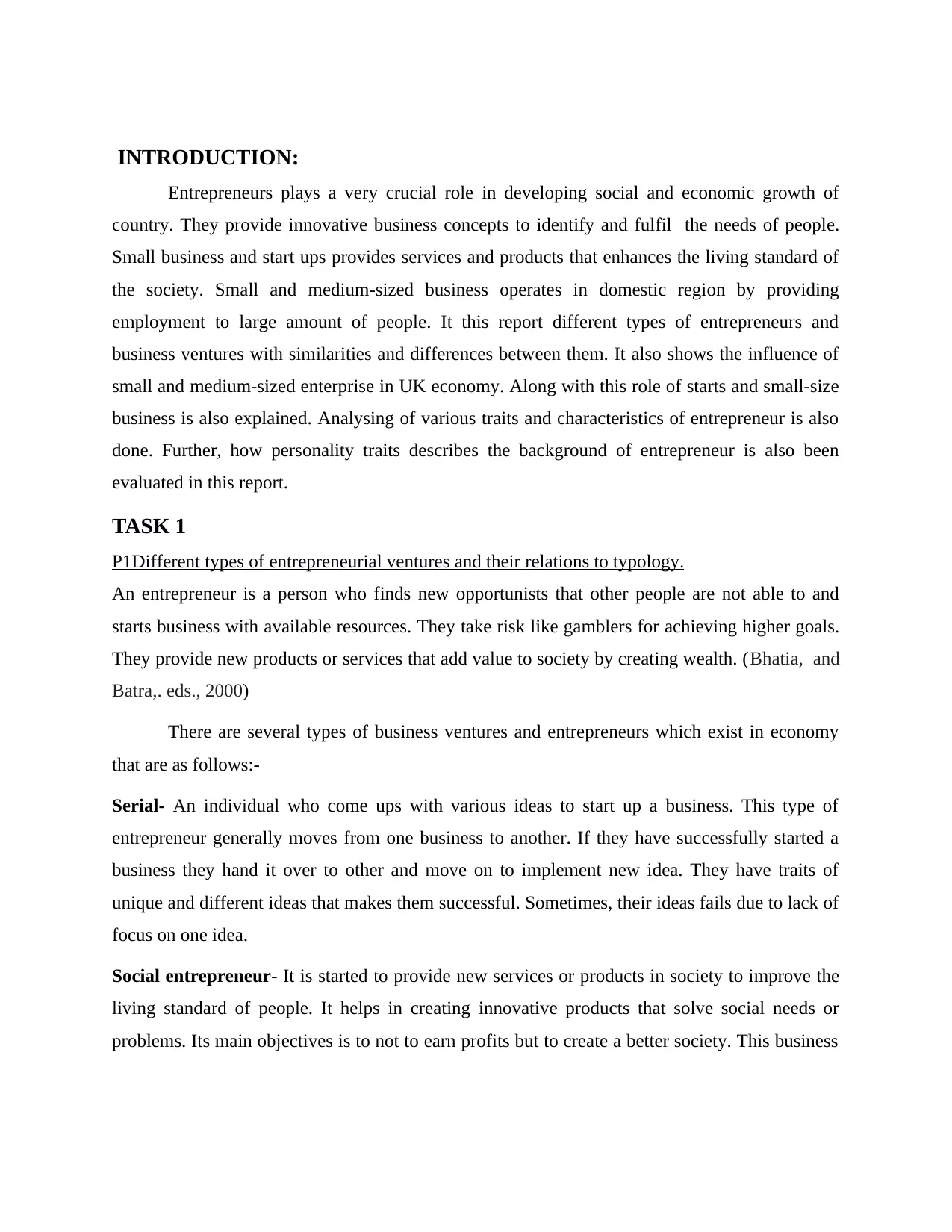
INTRODUCTION:
Entrepreneurs plays a very crucial role in developing social and economic growth of
country. They provide innovative business concepts to identify and fulfil the needs of people.
Small business and start ups provides services and products that enhances the living standard of
the society. Small and medium-sized business operates in domestic region by providing
employment to large amount of people. It this report different types of entrepreneurs and
business ventures with similarities and differences between them. It also shows the influence of
small and medium-sized enterprise in UK economy. Along with this role of starts and small-size
business is also explained. Analysing of various traits and characteristics of entrepreneur is also
done. Further, how personality traits describes the background of entrepreneur is also been
evaluated in this report.
TASK 1
P1Different types of entrepreneurial ventures and their relations to typology.
An entrepreneur is a person who finds new opportunists that other people are not able to and
starts business with available resources. They take risk like gamblers for achieving higher goals.
They provide new products or services that add value to society by creating wealth. (Bhatia, and
Batra,. eds., 2000)
There are several types of business ventures and entrepreneurs which exist in economy
that are as follows:-
Serial- An individual who come ups with various ideas to start up a business. This type of
entrepreneur generally moves from one business to another. If they have successfully started a
business they hand it over to other and move on to implement new idea. They have traits of
unique and different ideas that makes them successful. Sometimes, their ideas fails due to lack of
focus on one idea.
Social entrepreneur- It is started to provide new services or products in society to improve the
living standard of people. It helps in creating innovative products that solve social needs or
problems. Its main objectives is to not to earn profits but to create a better society. This business
Entrepreneurs plays a very crucial role in developing social and economic growth of
country. They provide innovative business concepts to identify and fulfil the needs of people.
Small business and start ups provides services and products that enhances the living standard of
the society. Small and medium-sized business operates in domestic region by providing
employment to large amount of people. It this report different types of entrepreneurs and
business ventures with similarities and differences between them. It also shows the influence of
small and medium-sized enterprise in UK economy. Along with this role of starts and small-size
business is also explained. Analysing of various traits and characteristics of entrepreneur is also
done. Further, how personality traits describes the background of entrepreneur is also been
evaluated in this report.
TASK 1
P1Different types of entrepreneurial ventures and their relations to typology.
An entrepreneur is a person who finds new opportunists that other people are not able to and
starts business with available resources. They take risk like gamblers for achieving higher goals.
They provide new products or services that add value to society by creating wealth. (Bhatia, and
Batra,. eds., 2000)
There are several types of business ventures and entrepreneurs which exist in economy
that are as follows:-
Serial- An individual who come ups with various ideas to start up a business. This type of
entrepreneur generally moves from one business to another. If they have successfully started a
business they hand it over to other and move on to implement new idea. They have traits of
unique and different ideas that makes them successful. Sometimes, their ideas fails due to lack of
focus on one idea.
Social entrepreneur- It is started to provide new services or products in society to improve the
living standard of people. It helps in creating innovative products that solve social needs or
problems. Its main objectives is to not to earn profits but to create a better society. This business
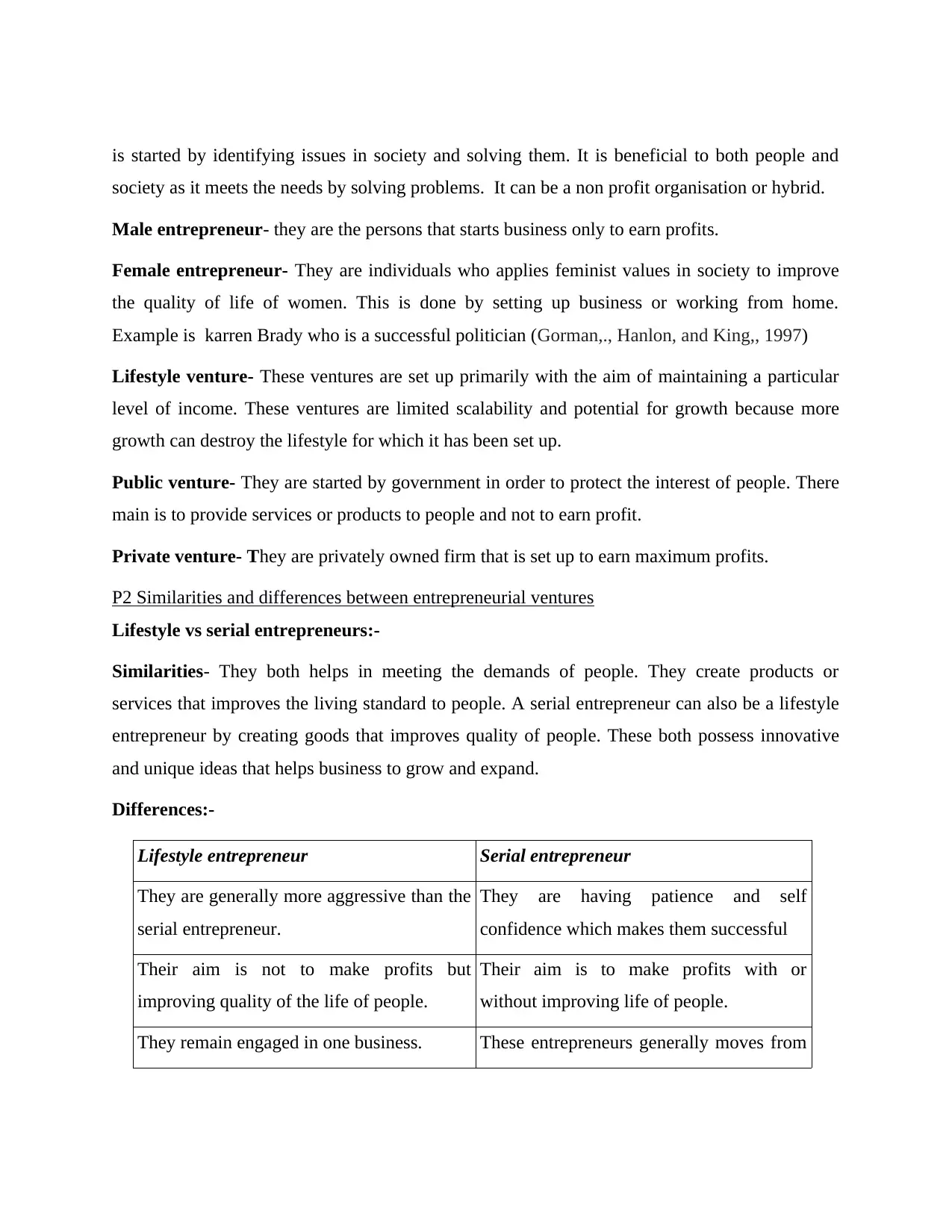
is started by identifying issues in society and solving them. It is beneficial to both people and
society as it meets the needs by solving problems. It can be a non profit organisation or hybrid.
Male entrepreneur- they are the persons that starts business only to earn profits.
Female entrepreneur- They are individuals who applies feminist values in society to improve
the quality of life of women. This is done by setting up business or working from home.
Example is karren Brady who is a successful politician (Gorman,., Hanlon, and King,, 1997)
Lifestyle venture- These ventures are set up primarily with the aim of maintaining a particular
level of income. These ventures are limited scalability and potential for growth because more
growth can destroy the lifestyle for which it has been set up.
Public venture- They are started by government in order to protect the interest of people. There
main is to provide services or products to people and not to earn profit.
Private venture- They are privately owned firm that is set up to earn maximum profits.
P2 Similarities and differences between entrepreneurial ventures
Lifestyle vs serial entrepreneurs:-
Similarities- They both helps in meeting the demands of people. They create products or
services that improves the living standard to people. A serial entrepreneur can also be a lifestyle
entrepreneur by creating goods that improves quality of people. These both possess innovative
and unique ideas that helps business to grow and expand.
Differences:-
Lifestyle entrepreneur Serial entrepreneur
They are generally more aggressive than the
serial entrepreneur.
They are having patience and self
confidence which makes them successful
Their aim is not to make profits but
improving quality of the life of people.
Their aim is to make profits with or
without improving life of people.
They remain engaged in one business. These entrepreneurs generally moves from
society as it meets the needs by solving problems. It can be a non profit organisation or hybrid.
Male entrepreneur- they are the persons that starts business only to earn profits.
Female entrepreneur- They are individuals who applies feminist values in society to improve
the quality of life of women. This is done by setting up business or working from home.
Example is karren Brady who is a successful politician (Gorman,., Hanlon, and King,, 1997)
Lifestyle venture- These ventures are set up primarily with the aim of maintaining a particular
level of income. These ventures are limited scalability and potential for growth because more
growth can destroy the lifestyle for which it has been set up.
Public venture- They are started by government in order to protect the interest of people. There
main is to provide services or products to people and not to earn profit.
Private venture- They are privately owned firm that is set up to earn maximum profits.
P2 Similarities and differences between entrepreneurial ventures
Lifestyle vs serial entrepreneurs:-
Similarities- They both helps in meeting the demands of people. They create products or
services that improves the living standard to people. A serial entrepreneur can also be a lifestyle
entrepreneur by creating goods that improves quality of people. These both possess innovative
and unique ideas that helps business to grow and expand.
Differences:-
Lifestyle entrepreneur Serial entrepreneur
They are generally more aggressive than the
serial entrepreneur.
They are having patience and self
confidence which makes them successful
Their aim is not to make profits but
improving quality of the life of people.
Their aim is to make profits with or
without improving life of people.
They remain engaged in one business. These entrepreneurs generally moves from
Secure Best Marks with AI Grader
Need help grading? Try our AI Grader for instant feedback on your assignments.
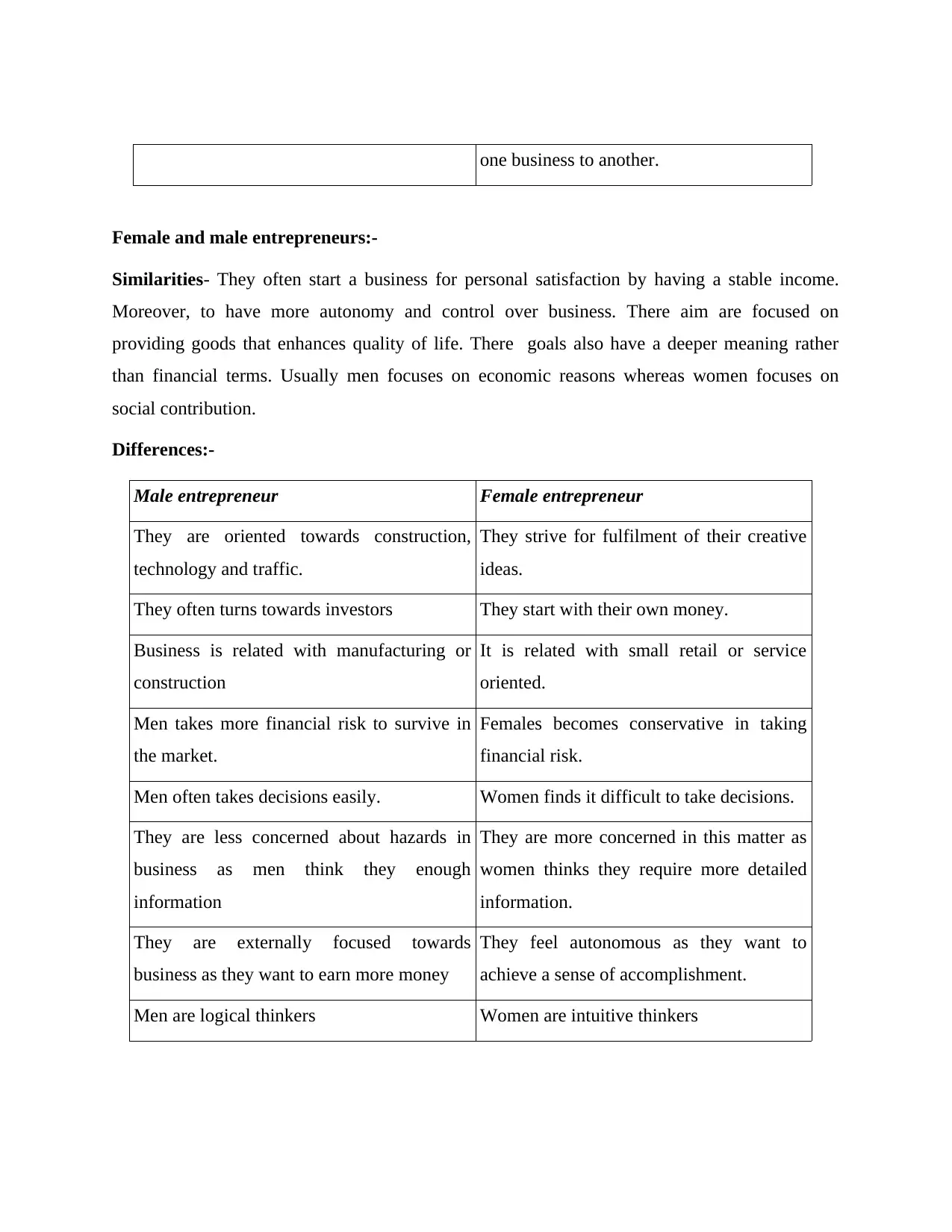
one business to another.
Female and male entrepreneurs:-
Similarities- They often start a business for personal satisfaction by having a stable income.
Moreover, to have more autonomy and control over business. There aim are focused on
providing goods that enhances quality of life. There goals also have a deeper meaning rather
than financial terms. Usually men focuses on economic reasons whereas women focuses on
social contribution.
Differences:-
Male entrepreneur Female entrepreneur
They are oriented towards construction,
technology and traffic.
They strive for fulfilment of their creative
ideas.
They often turns towards investors They start with their own money.
Business is related with manufacturing or
construction
It is related with small retail or service
oriented.
Men takes more financial risk to survive in
the market.
Females becomes conservative in taking
financial risk.
Men often takes decisions easily. Women finds it difficult to take decisions.
They are less concerned about hazards in
business as men think they enough
information
They are more concerned in this matter as
women thinks they require more detailed
information.
They are externally focused towards
business as they want to earn more money
They feel autonomous as they want to
achieve a sense of accomplishment.
Men are logical thinkers Women are intuitive thinkers
Female and male entrepreneurs:-
Similarities- They often start a business for personal satisfaction by having a stable income.
Moreover, to have more autonomy and control over business. There aim are focused on
providing goods that enhances quality of life. There goals also have a deeper meaning rather
than financial terms. Usually men focuses on economic reasons whereas women focuses on
social contribution.
Differences:-
Male entrepreneur Female entrepreneur
They are oriented towards construction,
technology and traffic.
They strive for fulfilment of their creative
ideas.
They often turns towards investors They start with their own money.
Business is related with manufacturing or
construction
It is related with small retail or service
oriented.
Men takes more financial risk to survive in
the market.
Females becomes conservative in taking
financial risk.
Men often takes decisions easily. Women finds it difficult to take decisions.
They are less concerned about hazards in
business as men think they enough
information
They are more concerned in this matter as
women thinks they require more detailed
information.
They are externally focused towards
business as they want to earn more money
They feel autonomous as they want to
achieve a sense of accomplishment.
Men are logical thinkers Women are intuitive thinkers
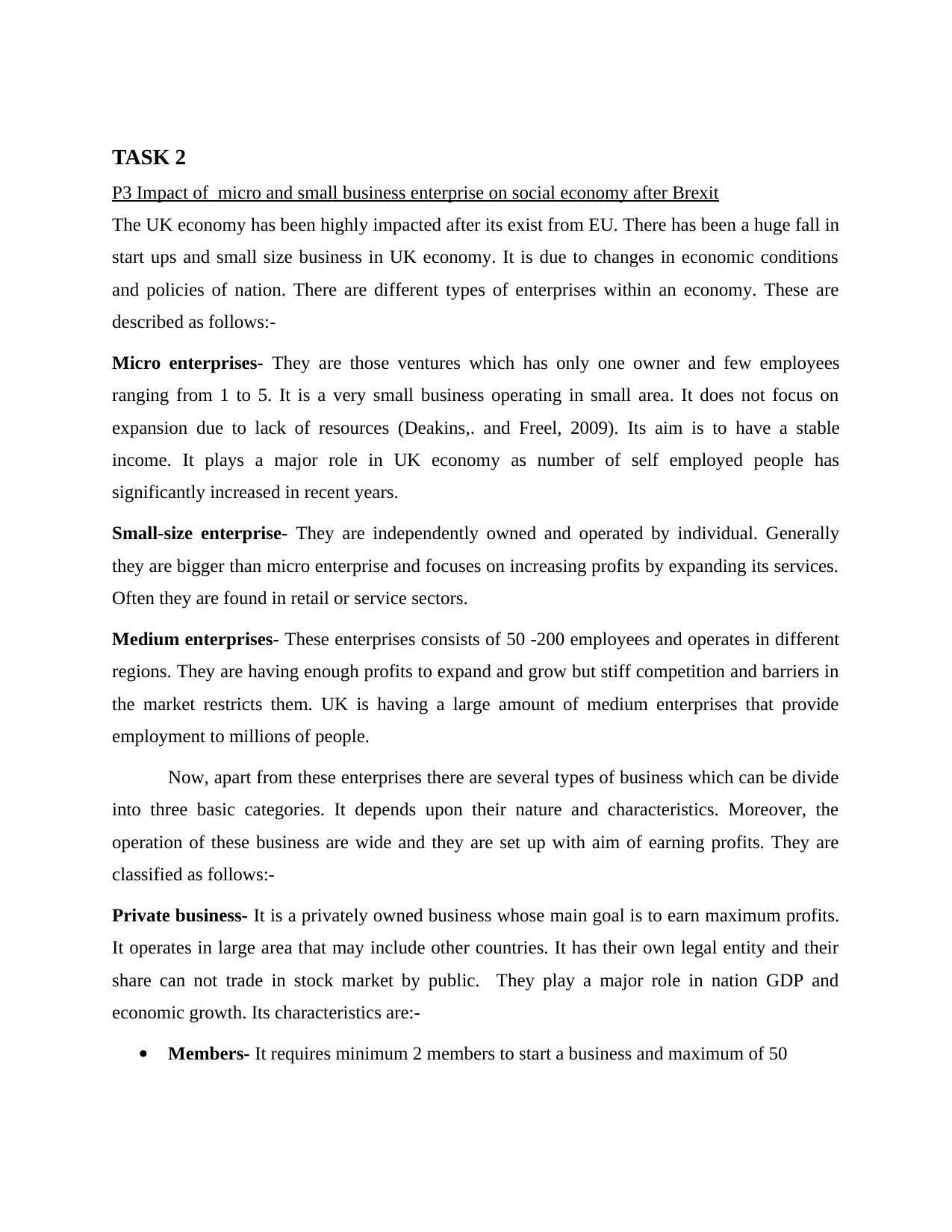
TASK 2
P3 Impact of micro and small business enterprise on social economy after Brexit
The UK economy has been highly impacted after its exist from EU. There has been a huge fall in
start ups and small size business in UK economy. It is due to changes in economic conditions
and policies of nation. There are different types of enterprises within an economy. These are
described as follows:-
Micro enterprises- They are those ventures which has only one owner and few employees
ranging from 1 to 5. It is a very small business operating in small area. It does not focus on
expansion due to lack of resources (Deakins,. and Freel, 2009). Its aim is to have a stable
income. It plays a major role in UK economy as number of self employed people has
significantly increased in recent years.
Small-size enterprise- They are independently owned and operated by individual. Generally
they are bigger than micro enterprise and focuses on increasing profits by expanding its services.
Often they are found in retail or service sectors.
Medium enterprises- These enterprises consists of 50 -200 employees and operates in different
regions. They are having enough profits to expand and grow but stiff competition and barriers in
the market restricts them. UK is having a large amount of medium enterprises that provide
employment to millions of people.
Now, apart from these enterprises there are several types of business which can be divide
into three basic categories. It depends upon their nature and characteristics. Moreover, the
operation of these business are wide and they are set up with aim of earning profits. They are
classified as follows:-
Private business- It is a privately owned business whose main goal is to earn maximum profits.
It operates in large area that may include other countries. It has their own legal entity and their
share can not trade in stock market by public. They play a major role in nation GDP and
economic growth. Its characteristics are:-
Members- It requires minimum 2 members to start a business and maximum of 50
P3 Impact of micro and small business enterprise on social economy after Brexit
The UK economy has been highly impacted after its exist from EU. There has been a huge fall in
start ups and small size business in UK economy. It is due to changes in economic conditions
and policies of nation. There are different types of enterprises within an economy. These are
described as follows:-
Micro enterprises- They are those ventures which has only one owner and few employees
ranging from 1 to 5. It is a very small business operating in small area. It does not focus on
expansion due to lack of resources (Deakins,. and Freel, 2009). Its aim is to have a stable
income. It plays a major role in UK economy as number of self employed people has
significantly increased in recent years.
Small-size enterprise- They are independently owned and operated by individual. Generally
they are bigger than micro enterprise and focuses on increasing profits by expanding its services.
Often they are found in retail or service sectors.
Medium enterprises- These enterprises consists of 50 -200 employees and operates in different
regions. They are having enough profits to expand and grow but stiff competition and barriers in
the market restricts them. UK is having a large amount of medium enterprises that provide
employment to millions of people.
Now, apart from these enterprises there are several types of business which can be divide
into three basic categories. It depends upon their nature and characteristics. Moreover, the
operation of these business are wide and they are set up with aim of earning profits. They are
classified as follows:-
Private business- It is a privately owned business whose main goal is to earn maximum profits.
It operates in large area that may include other countries. It has their own legal entity and their
share can not trade in stock market by public. They play a major role in nation GDP and
economic growth. Its characteristics are:-
Members- It requires minimum 2 members to start a business and maximum of 50
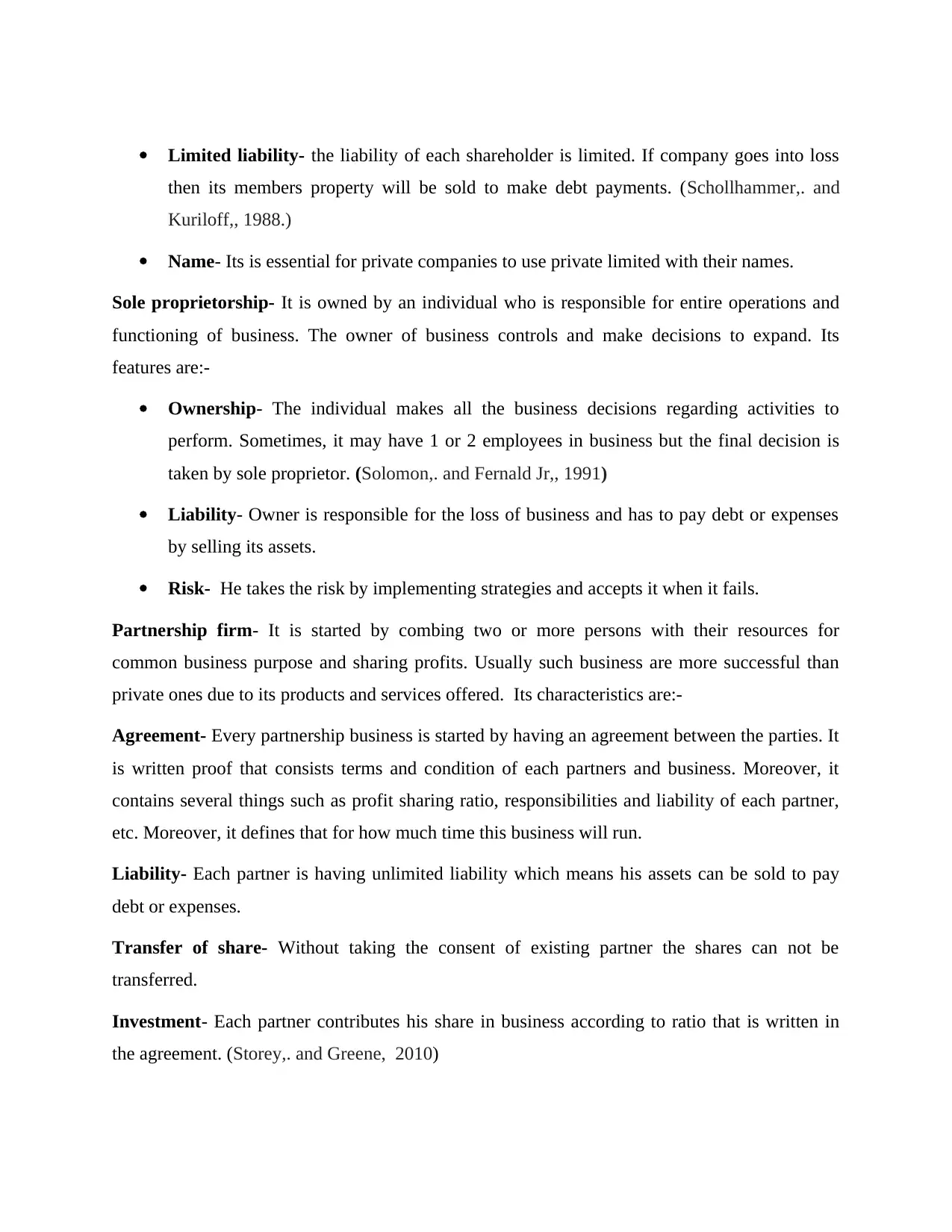
Limited liability- the liability of each shareholder is limited. If company goes into loss
then its members property will be sold to make debt payments. (Schollhammer,. and
Kuriloff,, 1988.)
Name- Its is essential for private companies to use private limited with their names.
Sole proprietorship- It is owned by an individual who is responsible for entire operations and
functioning of business. The owner of business controls and make decisions to expand. Its
features are:-
Ownership- The individual makes all the business decisions regarding activities to
perform. Sometimes, it may have 1 or 2 employees in business but the final decision is
taken by sole proprietor. (Solomon,. and Fernald Jr,, 1991)
Liability- Owner is responsible for the loss of business and has to pay debt or expenses
by selling its assets.
Risk- He takes the risk by implementing strategies and accepts it when it fails.
Partnership firm- It is started by combing two or more persons with their resources for
common business purpose and sharing profits. Usually such business are more successful than
private ones due to its products and services offered. Its characteristics are:-
Agreement- Every partnership business is started by having an agreement between the parties. It
is written proof that consists terms and condition of each partners and business. Moreover, it
contains several things such as profit sharing ratio, responsibilities and liability of each partner,
etc. Moreover, it defines that for how much time this business will run.
Liability- Each partner is having unlimited liability which means his assets can be sold to pay
debt or expenses.
Transfer of share- Without taking the consent of existing partner the shares can not be
transferred.
Investment- Each partner contributes his share in business according to ratio that is written in
the agreement. (Storey,. and Greene, 2010)
then its members property will be sold to make debt payments. (Schollhammer,. and
Kuriloff,, 1988.)
Name- Its is essential for private companies to use private limited with their names.
Sole proprietorship- It is owned by an individual who is responsible for entire operations and
functioning of business. The owner of business controls and make decisions to expand. Its
features are:-
Ownership- The individual makes all the business decisions regarding activities to
perform. Sometimes, it may have 1 or 2 employees in business but the final decision is
taken by sole proprietor. (Solomon,. and Fernald Jr,, 1991)
Liability- Owner is responsible for the loss of business and has to pay debt or expenses
by selling its assets.
Risk- He takes the risk by implementing strategies and accepts it when it fails.
Partnership firm- It is started by combing two or more persons with their resources for
common business purpose and sharing profits. Usually such business are more successful than
private ones due to its products and services offered. Its characteristics are:-
Agreement- Every partnership business is started by having an agreement between the parties. It
is written proof that consists terms and condition of each partners and business. Moreover, it
contains several things such as profit sharing ratio, responsibilities and liability of each partner,
etc. Moreover, it defines that for how much time this business will run.
Liability- Each partner is having unlimited liability which means his assets can be sold to pay
debt or expenses.
Transfer of share- Without taking the consent of existing partner the shares can not be
transferred.
Investment- Each partner contributes his share in business according to ratio that is written in
the agreement. (Storey,. and Greene, 2010)
Paraphrase This Document
Need a fresh take? Get an instant paraphrase of this document with our AI Paraphraser
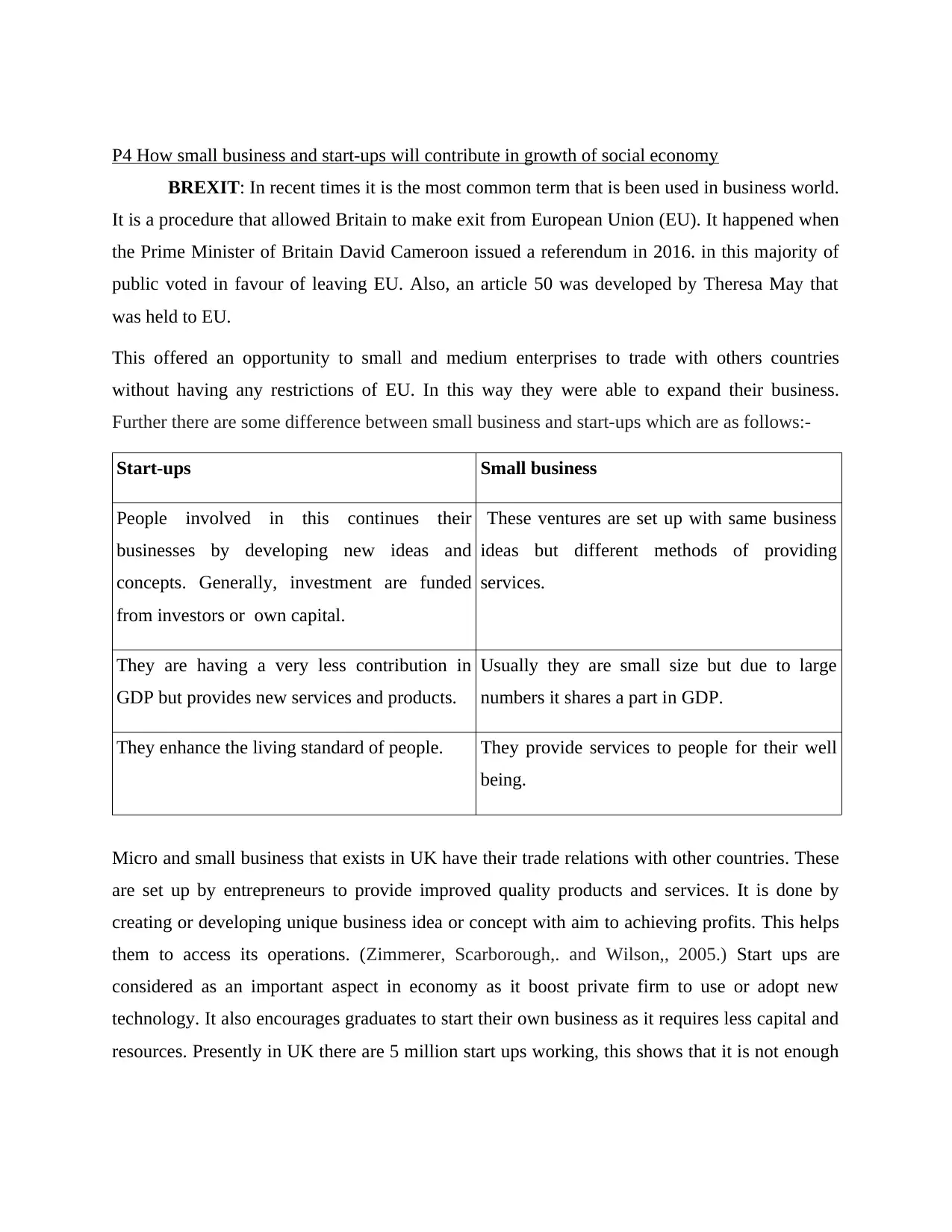
P4 How small business and start-ups will contribute in growth of social economy
BREXIT: In recent times it is the most common term that is been used in business world.
It is a procedure that allowed Britain to make exit from European Union (EU). It happened when
the Prime Minister of Britain David Cameroon issued a referendum in 2016. in this majority of
public voted in favour of leaving EU. Also, an article 50 was developed by Theresa May that
was held to EU.
This offered an opportunity to small and medium enterprises to trade with others countries
without having any restrictions of EU. In this way they were able to expand their business.
Further there are some difference between small business and start-ups which are as follows:-
Start-ups Small business
People involved in this continues their
businesses by developing new ideas and
concepts. Generally, investment are funded
from investors or own capital.
These ventures are set up with same business
ideas but different methods of providing
services.
They are having a very less contribution in
GDP but provides new services and products.
Usually they are small size but due to large
numbers it shares a part in GDP.
They enhance the living standard of people. They provide services to people for their well
being.
Micro and small business that exists in UK have their trade relations with other countries. These
are set up by entrepreneurs to provide improved quality products and services. It is done by
creating or developing unique business idea or concept with aim to achieving profits. This helps
them to access its operations. (Zimmerer, Scarborough,. and Wilson,, 2005.) Start ups are
considered as an important aspect in economy as it boost private firm to use or adopt new
technology. It also encourages graduates to start their own business as it requires less capital and
resources. Presently in UK there are 5 million start ups working, this shows that it is not enough
BREXIT: In recent times it is the most common term that is been used in business world.
It is a procedure that allowed Britain to make exit from European Union (EU). It happened when
the Prime Minister of Britain David Cameroon issued a referendum in 2016. in this majority of
public voted in favour of leaving EU. Also, an article 50 was developed by Theresa May that
was held to EU.
This offered an opportunity to small and medium enterprises to trade with others countries
without having any restrictions of EU. In this way they were able to expand their business.
Further there are some difference between small business and start-ups which are as follows:-
Start-ups Small business
People involved in this continues their
businesses by developing new ideas and
concepts. Generally, investment are funded
from investors or own capital.
These ventures are set up with same business
ideas but different methods of providing
services.
They are having a very less contribution in
GDP but provides new services and products.
Usually they are small size but due to large
numbers it shares a part in GDP.
They enhance the living standard of people. They provide services to people for their well
being.
Micro and small business that exists in UK have their trade relations with other countries. These
are set up by entrepreneurs to provide improved quality products and services. It is done by
creating or developing unique business idea or concept with aim to achieving profits. This helps
them to access its operations. (Zimmerer, Scarborough,. and Wilson,, 2005.) Start ups are
considered as an important aspect in economy as it boost private firm to use or adopt new
technology. It also encourages graduates to start their own business as it requires less capital and
resources. Presently in UK there are 5 million start ups working, this shows that it is not enough
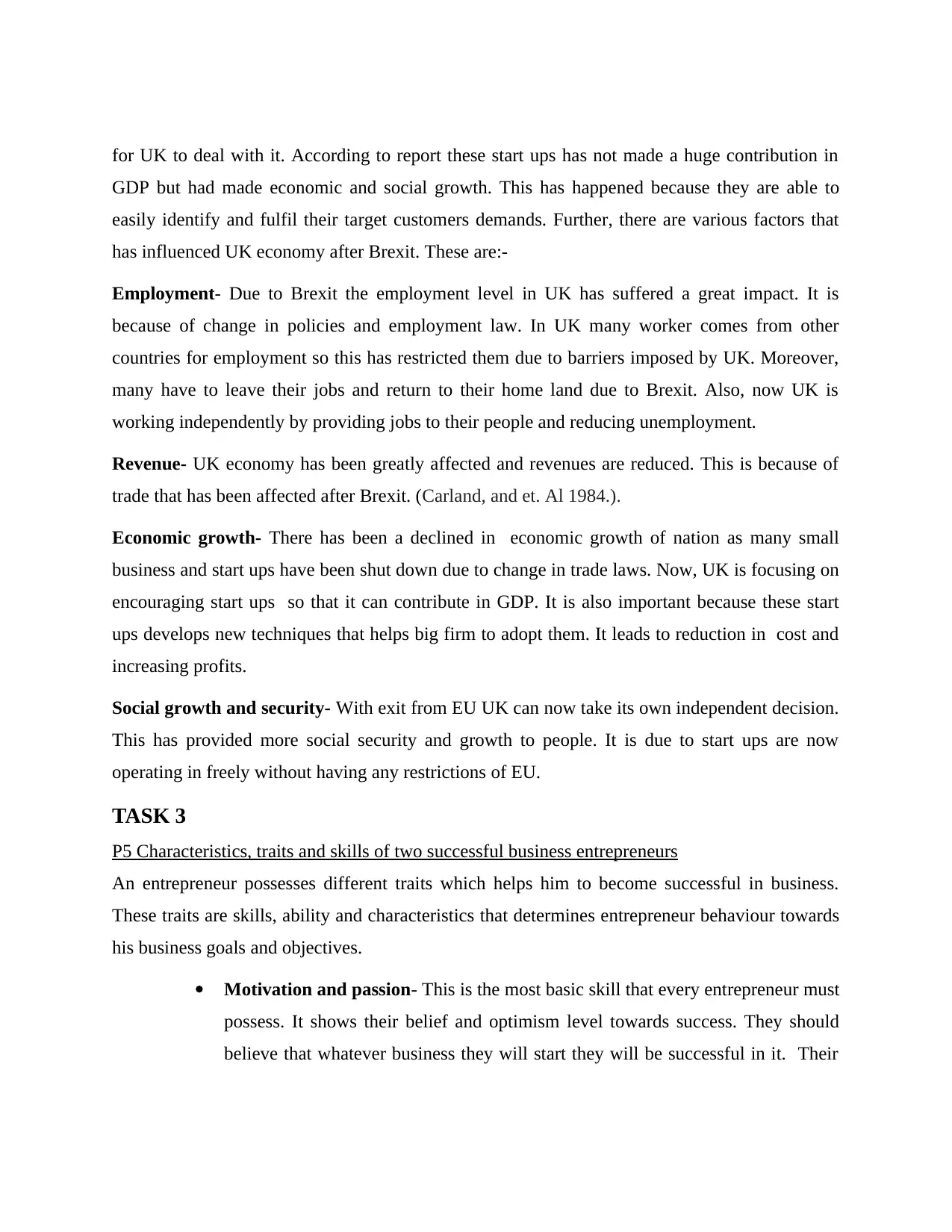
for UK to deal with it. According to report these start ups has not made a huge contribution in
GDP but had made economic and social growth. This has happened because they are able to
easily identify and fulfil their target customers demands. Further, there are various factors that
has influenced UK economy after Brexit. These are:-
Employment- Due to Brexit the employment level in UK has suffered a great impact. It is
because of change in policies and employment law. In UK many worker comes from other
countries for employment so this has restricted them due to barriers imposed by UK. Moreover,
many have to leave their jobs and return to their home land due to Brexit. Also, now UK is
working independently by providing jobs to their people and reducing unemployment.
Revenue- UK economy has been greatly affected and revenues are reduced. This is because of
trade that has been affected after Brexit. (Carland, and et. Al 1984.).
Economic growth- There has been a declined in economic growth of nation as many small
business and start ups have been shut down due to change in trade laws. Now, UK is focusing on
encouraging start ups so that it can contribute in GDP. It is also important because these start
ups develops new techniques that helps big firm to adopt them. It leads to reduction in cost and
increasing profits.
Social growth and security- With exit from EU UK can now take its own independent decision.
This has provided more social security and growth to people. It is due to start ups are now
operating in freely without having any restrictions of EU.
TASK 3
P5 Characteristics, traits and skills of two successful business entrepreneurs
An entrepreneur possesses different traits which helps him to become successful in business.
These traits are skills, ability and characteristics that determines entrepreneur behaviour towards
his business goals and objectives.
Motivation and passion- This is the most basic skill that every entrepreneur must
possess. It shows their belief and optimism level towards success. They should
believe that whatever business they will start they will be successful in it. Their
GDP but had made economic and social growth. This has happened because they are able to
easily identify and fulfil their target customers demands. Further, there are various factors that
has influenced UK economy after Brexit. These are:-
Employment- Due to Brexit the employment level in UK has suffered a great impact. It is
because of change in policies and employment law. In UK many worker comes from other
countries for employment so this has restricted them due to barriers imposed by UK. Moreover,
many have to leave their jobs and return to their home land due to Brexit. Also, now UK is
working independently by providing jobs to their people and reducing unemployment.
Revenue- UK economy has been greatly affected and revenues are reduced. This is because of
trade that has been affected after Brexit. (Carland, and et. Al 1984.).
Economic growth- There has been a declined in economic growth of nation as many small
business and start ups have been shut down due to change in trade laws. Now, UK is focusing on
encouraging start ups so that it can contribute in GDP. It is also important because these start
ups develops new techniques that helps big firm to adopt them. It leads to reduction in cost and
increasing profits.
Social growth and security- With exit from EU UK can now take its own independent decision.
This has provided more social security and growth to people. It is due to start ups are now
operating in freely without having any restrictions of EU.
TASK 3
P5 Characteristics, traits and skills of two successful business entrepreneurs
An entrepreneur possesses different traits which helps him to become successful in business.
These traits are skills, ability and characteristics that determines entrepreneur behaviour towards
his business goals and objectives.
Motivation and passion- This is the most basic skill that every entrepreneur must
possess. It shows their belief and optimism level towards success. They should
believe that whatever business they will start they will be successful in it. Their
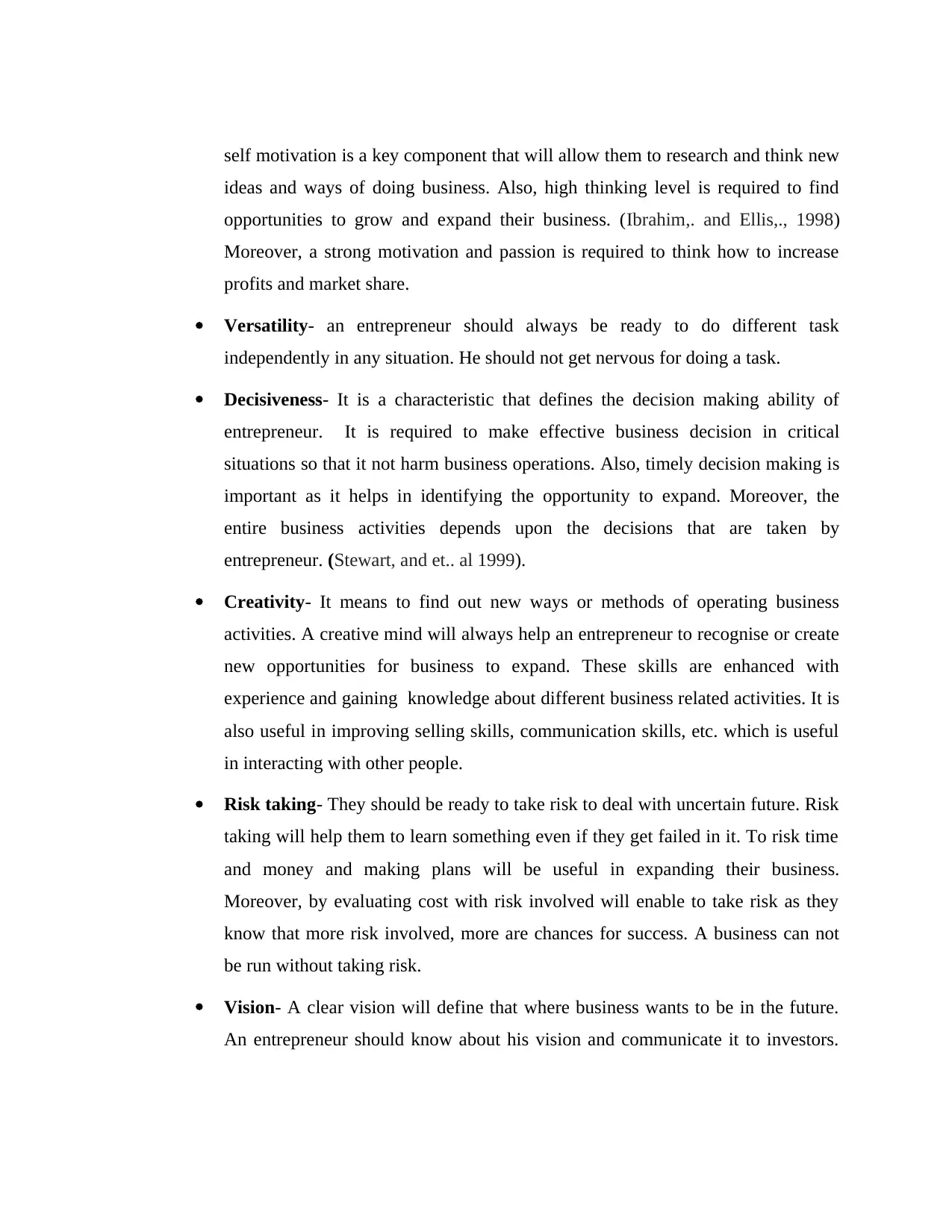
self motivation is a key component that will allow them to research and think new
ideas and ways of doing business. Also, high thinking level is required to find
opportunities to grow and expand their business. (Ibrahim,. and Ellis,., 1998)
Moreover, a strong motivation and passion is required to think how to increase
profits and market share.
Versatility- an entrepreneur should always be ready to do different task
independently in any situation. He should not get nervous for doing a task.
Decisiveness- It is a characteristic that defines the decision making ability of
entrepreneur. It is required to make effective business decision in critical
situations so that it not harm business operations. Also, timely decision making is
important as it helps in identifying the opportunity to expand. Moreover, the
entire business activities depends upon the decisions that are taken by
entrepreneur. (Stewart, and et.. al 1999).
Creativity- It means to find out new ways or methods of operating business
activities. A creative mind will always help an entrepreneur to recognise or create
new opportunities for business to expand. These skills are enhanced with
experience and gaining knowledge about different business related activities. It is
also useful in improving selling skills, communication skills, etc. which is useful
in interacting with other people.
Risk taking- They should be ready to take risk to deal with uncertain future. Risk
taking will help them to learn something even if they get failed in it. To risk time
and money and making plans will be useful in expanding their business.
Moreover, by evaluating cost with risk involved will enable to take risk as they
know that more risk involved, more are chances for success. A business can not
be run without taking risk.
Vision- A clear vision will define that where business wants to be in the future.
An entrepreneur should know about his vision and communicate it to investors.
ideas and ways of doing business. Also, high thinking level is required to find
opportunities to grow and expand their business. (Ibrahim,. and Ellis,., 1998)
Moreover, a strong motivation and passion is required to think how to increase
profits and market share.
Versatility- an entrepreneur should always be ready to do different task
independently in any situation. He should not get nervous for doing a task.
Decisiveness- It is a characteristic that defines the decision making ability of
entrepreneur. It is required to make effective business decision in critical
situations so that it not harm business operations. Also, timely decision making is
important as it helps in identifying the opportunity to expand. Moreover, the
entire business activities depends upon the decisions that are taken by
entrepreneur. (Stewart, and et.. al 1999).
Creativity- It means to find out new ways or methods of operating business
activities. A creative mind will always help an entrepreneur to recognise or create
new opportunities for business to expand. These skills are enhanced with
experience and gaining knowledge about different business related activities. It is
also useful in improving selling skills, communication skills, etc. which is useful
in interacting with other people.
Risk taking- They should be ready to take risk to deal with uncertain future. Risk
taking will help them to learn something even if they get failed in it. To risk time
and money and making plans will be useful in expanding their business.
Moreover, by evaluating cost with risk involved will enable to take risk as they
know that more risk involved, more are chances for success. A business can not
be run without taking risk.
Vision- A clear vision will define that where business wants to be in the future.
An entrepreneur should know about his vision and communicate it to investors.
Secure Best Marks with AI Grader
Need help grading? Try our AI Grader for instant feedback on your assignments.
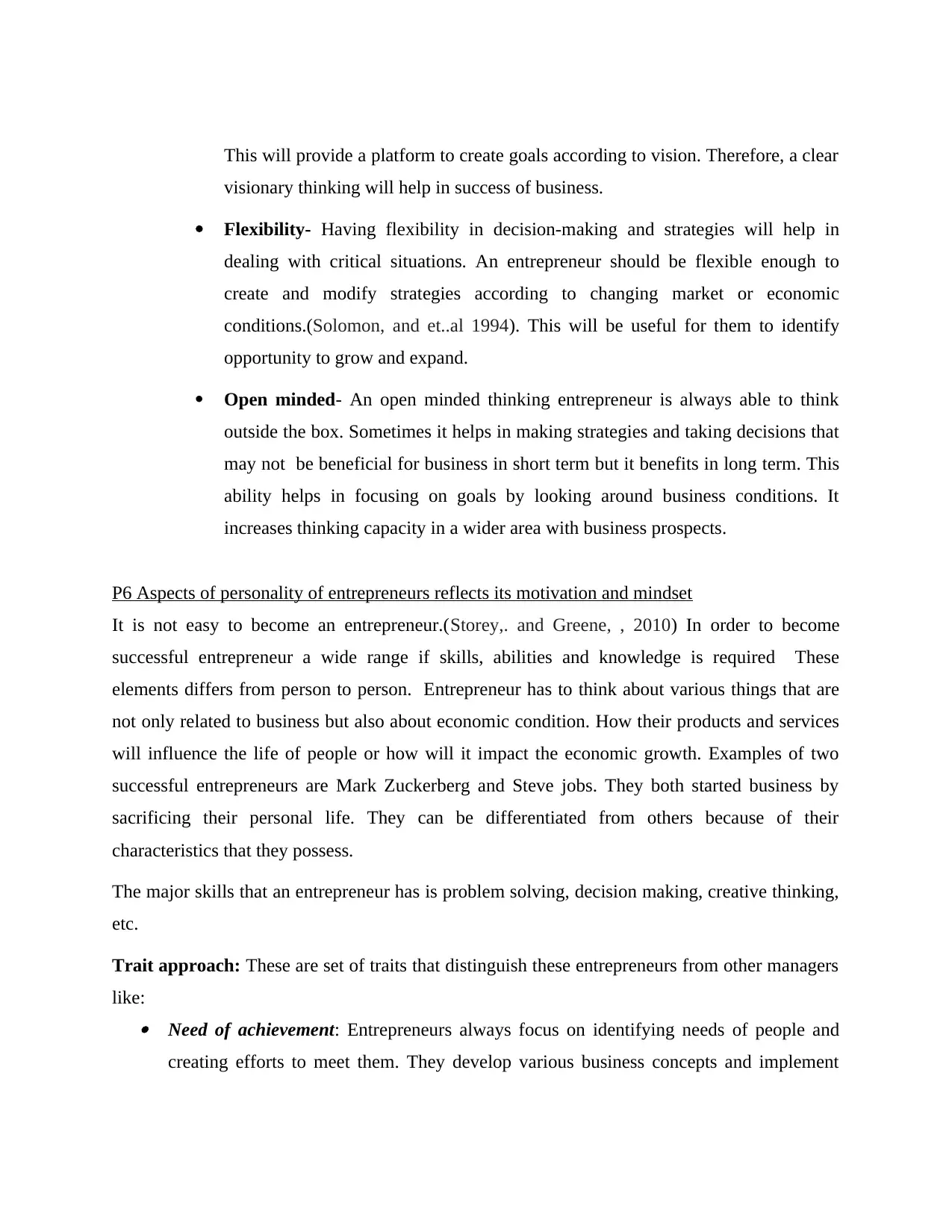
This will provide a platform to create goals according to vision. Therefore, a clear
visionary thinking will help in success of business.
Flexibility- Having flexibility in decision-making and strategies will help in
dealing with critical situations. An entrepreneur should be flexible enough to
create and modify strategies according to changing market or economic
conditions.(Solomon, and et..al 1994). This will be useful for them to identify
opportunity to grow and expand.
Open minded- An open minded thinking entrepreneur is always able to think
outside the box. Sometimes it helps in making strategies and taking decisions that
may not be beneficial for business in short term but it benefits in long term. This
ability helps in focusing on goals by looking around business conditions. It
increases thinking capacity in a wider area with business prospects.
P6 Aspects of personality of entrepreneurs reflects its motivation and mindset
It is not easy to become an entrepreneur.(Storey,. and Greene, , 2010) In order to become
successful entrepreneur a wide range if skills, abilities and knowledge is required These
elements differs from person to person. Entrepreneur has to think about various things that are
not only related to business but also about economic condition. How their products and services
will influence the life of people or how will it impact the economic growth. Examples of two
successful entrepreneurs are Mark Zuckerberg and Steve jobs. They both started business by
sacrificing their personal life. They can be differentiated from others because of their
characteristics that they possess.
The major skills that an entrepreneur has is problem solving, decision making, creative thinking,
etc.
Trait approach: These are set of traits that distinguish these entrepreneurs from other managers
like: Need of achievement: Entrepreneurs always focus on identifying needs of people and
creating efforts to meet them. They develop various business concepts and implement
visionary thinking will help in success of business.
Flexibility- Having flexibility in decision-making and strategies will help in
dealing with critical situations. An entrepreneur should be flexible enough to
create and modify strategies according to changing market or economic
conditions.(Solomon, and et..al 1994). This will be useful for them to identify
opportunity to grow and expand.
Open minded- An open minded thinking entrepreneur is always able to think
outside the box. Sometimes it helps in making strategies and taking decisions that
may not be beneficial for business in short term but it benefits in long term. This
ability helps in focusing on goals by looking around business conditions. It
increases thinking capacity in a wider area with business prospects.
P6 Aspects of personality of entrepreneurs reflects its motivation and mindset
It is not easy to become an entrepreneur.(Storey,. and Greene, , 2010) In order to become
successful entrepreneur a wide range if skills, abilities and knowledge is required These
elements differs from person to person. Entrepreneur has to think about various things that are
not only related to business but also about economic condition. How their products and services
will influence the life of people or how will it impact the economic growth. Examples of two
successful entrepreneurs are Mark Zuckerberg and Steve jobs. They both started business by
sacrificing their personal life. They can be differentiated from others because of their
characteristics that they possess.
The major skills that an entrepreneur has is problem solving, decision making, creative thinking,
etc.
Trait approach: These are set of traits that distinguish these entrepreneurs from other managers
like: Need of achievement: Entrepreneurs always focus on identifying needs of people and
creating efforts to meet them. They develop various business concepts and implement
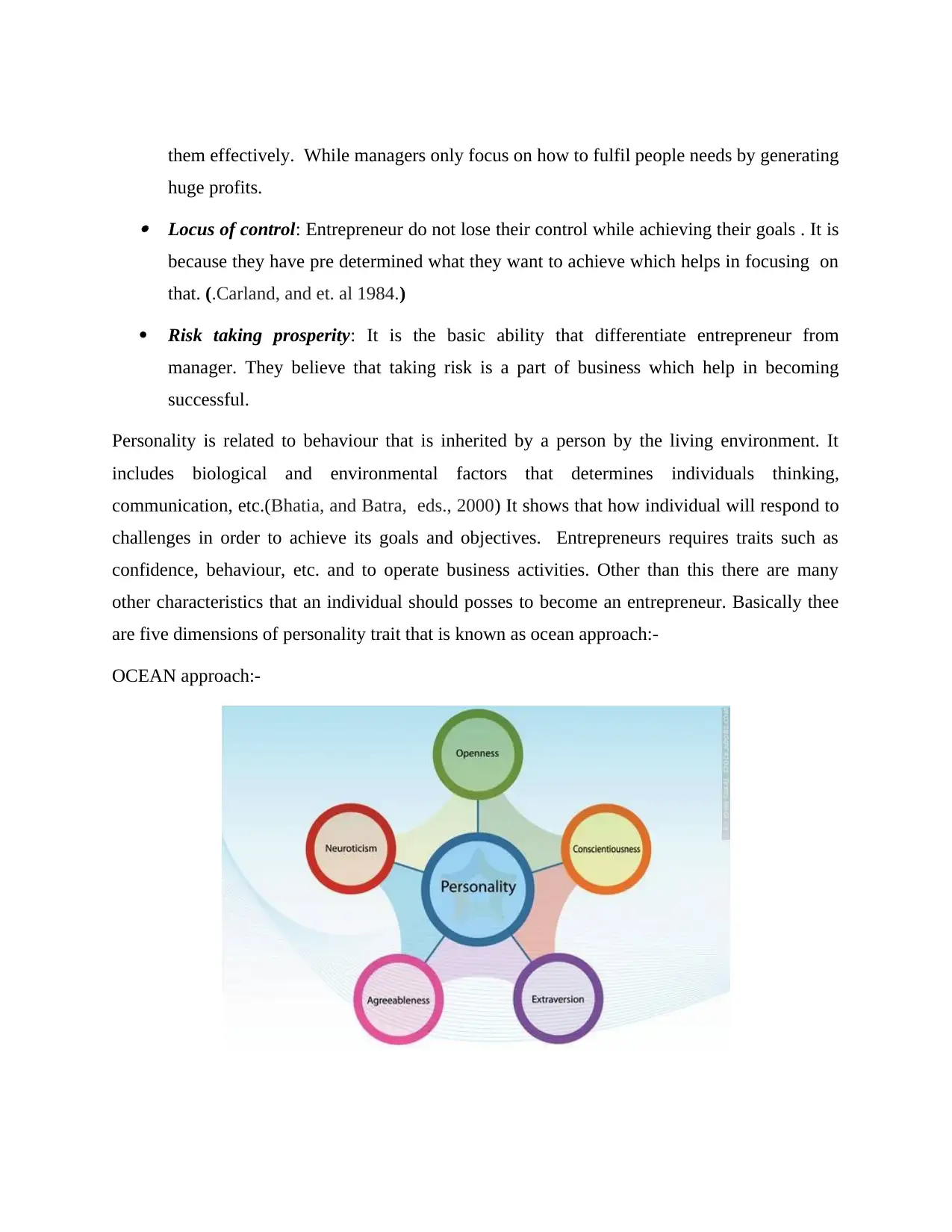
them effectively. While managers only focus on how to fulfil people needs by generating
huge profits. Locus of control: Entrepreneur do not lose their control while achieving their goals . It is
because they have pre determined what they want to achieve which helps in focusing on
that. (.Carland, and et. al 1984.)
Risk taking prosperity: It is the basic ability that differentiate entrepreneur from
manager. They believe that taking risk is a part of business which help in becoming
successful.
Personality is related to behaviour that is inherited by a person by the living environment. It
includes biological and environmental factors that determines individuals thinking,
communication, etc.(Bhatia, and Batra, eds., 2000) It shows that how individual will respond to
challenges in order to achieve its goals and objectives. Entrepreneurs requires traits such as
confidence, behaviour, etc. and to operate business activities. Other than this there are many
other characteristics that an individual should posses to become an entrepreneur. Basically thee
are five dimensions of personality trait that is known as ocean approach:-
OCEAN approach:-
huge profits. Locus of control: Entrepreneur do not lose their control while achieving their goals . It is
because they have pre determined what they want to achieve which helps in focusing on
that. (.Carland, and et. al 1984.)
Risk taking prosperity: It is the basic ability that differentiate entrepreneur from
manager. They believe that taking risk is a part of business which help in becoming
successful.
Personality is related to behaviour that is inherited by a person by the living environment. It
includes biological and environmental factors that determines individuals thinking,
communication, etc.(Bhatia, and Batra, eds., 2000) It shows that how individual will respond to
challenges in order to achieve its goals and objectives. Entrepreneurs requires traits such as
confidence, behaviour, etc. and to operate business activities. Other than this there are many
other characteristics that an individual should posses to become an entrepreneur. Basically thee
are five dimensions of personality trait that is known as ocean approach:-
OCEAN approach:-
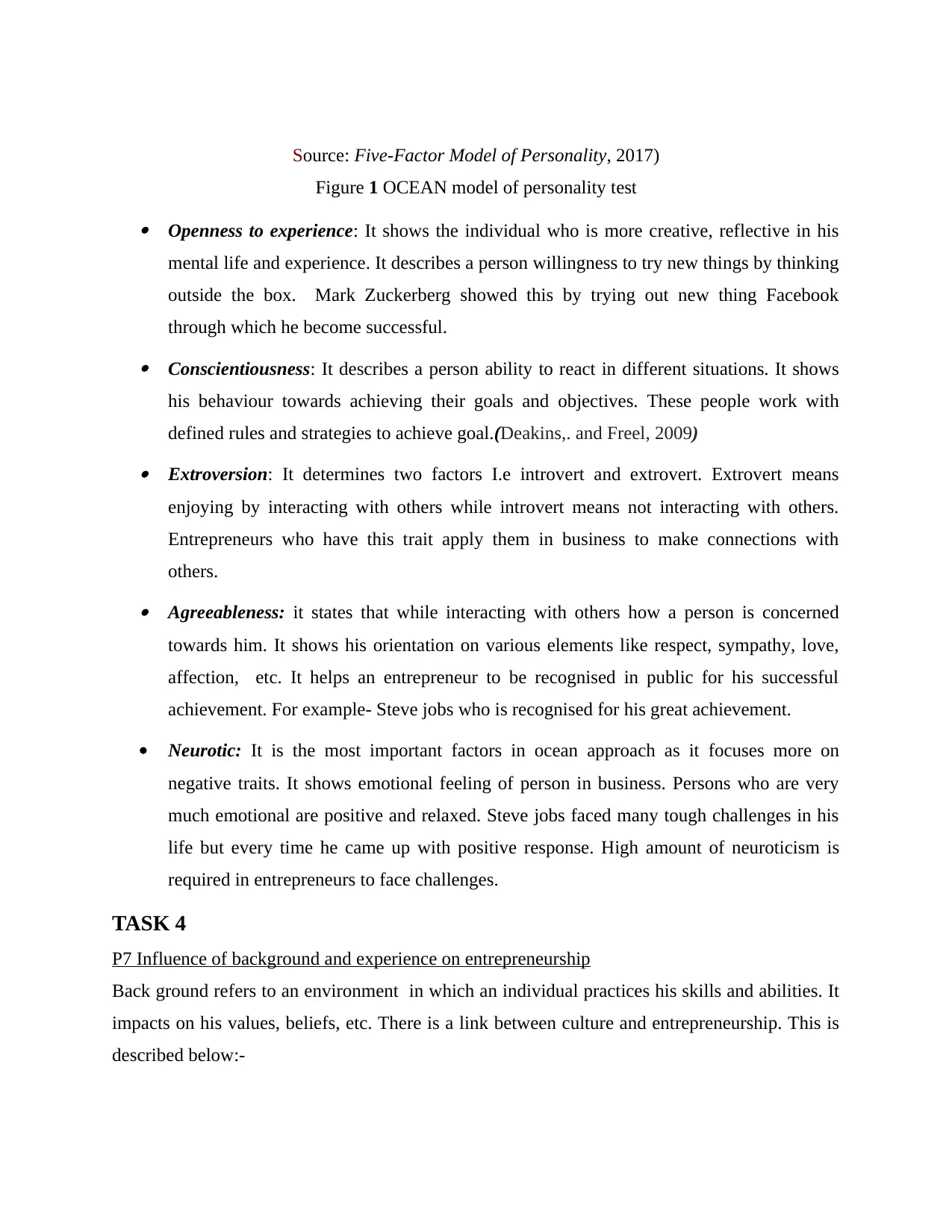
Source: Five-Factor Model of Personality, 2017)
Figure 1 OCEAN model of personality test Openness to experience: It shows the individual who is more creative, reflective in his
mental life and experience. It describes a person willingness to try new things by thinking
outside the box. Mark Zuckerberg showed this by trying out new thing Facebook
through which he become successful. Conscientiousness: It describes a person ability to react in different situations. It shows
his behaviour towards achieving their goals and objectives. These people work with
defined rules and strategies to achieve goal.(Deakins,. and Freel, 2009) Extroversion: It determines two factors I.e introvert and extrovert. Extrovert means
enjoying by interacting with others while introvert means not interacting with others.
Entrepreneurs who have this trait apply them in business to make connections with
others. Agreeableness: it states that while interacting with others how a person is concerned
towards him. It shows his orientation on various elements like respect, sympathy, love,
affection, etc. It helps an entrepreneur to be recognised in public for his successful
achievement. For example- Steve jobs who is recognised for his great achievement.
Neurotic: It is the most important factors in ocean approach as it focuses more on
negative traits. It shows emotional feeling of person in business. Persons who are very
much emotional are positive and relaxed. Steve jobs faced many tough challenges in his
life but every time he came up with positive response. High amount of neuroticism is
required in entrepreneurs to face challenges.
TASK 4
P7 Influence of background and experience on entrepreneurship
Back ground refers to an environment in which an individual practices his skills and abilities. It
impacts on his values, beliefs, etc. There is a link between culture and entrepreneurship. This is
described below:-
Figure 1 OCEAN model of personality test Openness to experience: It shows the individual who is more creative, reflective in his
mental life and experience. It describes a person willingness to try new things by thinking
outside the box. Mark Zuckerberg showed this by trying out new thing Facebook
through which he become successful. Conscientiousness: It describes a person ability to react in different situations. It shows
his behaviour towards achieving their goals and objectives. These people work with
defined rules and strategies to achieve goal.(Deakins,. and Freel, 2009) Extroversion: It determines two factors I.e introvert and extrovert. Extrovert means
enjoying by interacting with others while introvert means not interacting with others.
Entrepreneurs who have this trait apply them in business to make connections with
others. Agreeableness: it states that while interacting with others how a person is concerned
towards him. It shows his orientation on various elements like respect, sympathy, love,
affection, etc. It helps an entrepreneur to be recognised in public for his successful
achievement. For example- Steve jobs who is recognised for his great achievement.
Neurotic: It is the most important factors in ocean approach as it focuses more on
negative traits. It shows emotional feeling of person in business. Persons who are very
much emotional are positive and relaxed. Steve jobs faced many tough challenges in his
life but every time he came up with positive response. High amount of neuroticism is
required in entrepreneurs to face challenges.
TASK 4
P7 Influence of background and experience on entrepreneurship
Back ground refers to an environment in which an individual practices his skills and abilities. It
impacts on his values, beliefs, etc. There is a link between culture and entrepreneurship. This is
described below:-
Paraphrase This Document
Need a fresh take? Get an instant paraphrase of this document with our AI Paraphraser
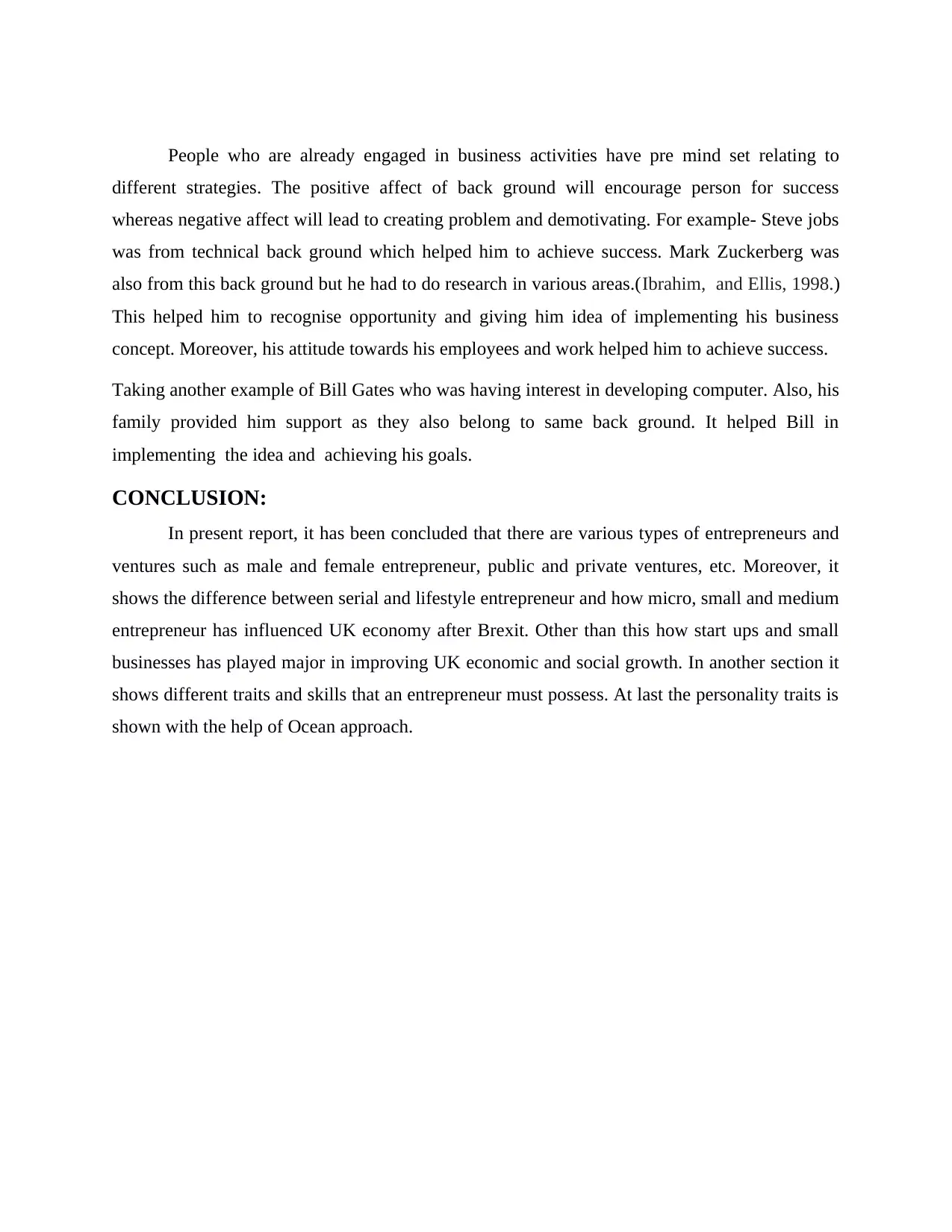
People who are already engaged in business activities have pre mind set relating to
different strategies. The positive affect of back ground will encourage person for success
whereas negative affect will lead to creating problem and demotivating. For example- Steve jobs
was from technical back ground which helped him to achieve success. Mark Zuckerberg was
also from this back ground but he had to do research in various areas.(Ibrahim, and Ellis, 1998.)
This helped him to recognise opportunity and giving him idea of implementing his business
concept. Moreover, his attitude towards his employees and work helped him to achieve success.
Taking another example of Bill Gates who was having interest in developing computer. Also, his
family provided him support as they also belong to same back ground. It helped Bill in
implementing the idea and achieving his goals.
CONCLUSION:
In present report, it has been concluded that there are various types of entrepreneurs and
ventures such as male and female entrepreneur, public and private ventures, etc. Moreover, it
shows the difference between serial and lifestyle entrepreneur and how micro, small and medium
entrepreneur has influenced UK economy after Brexit. Other than this how start ups and small
businesses has played major in improving UK economic and social growth. In another section it
shows different traits and skills that an entrepreneur must possess. At last the personality traits is
shown with the help of Ocean approach.
different strategies. The positive affect of back ground will encourage person for success
whereas negative affect will lead to creating problem and demotivating. For example- Steve jobs
was from technical back ground which helped him to achieve success. Mark Zuckerberg was
also from this back ground but he had to do research in various areas.(Ibrahim, and Ellis, 1998.)
This helped him to recognise opportunity and giving him idea of implementing his business
concept. Moreover, his attitude towards his employees and work helped him to achieve success.
Taking another example of Bill Gates who was having interest in developing computer. Also, his
family provided him support as they also belong to same back ground. It helped Bill in
implementing the idea and achieving his goals.
CONCLUSION:
In present report, it has been concluded that there are various types of entrepreneurs and
ventures such as male and female entrepreneur, public and private ventures, etc. Moreover, it
shows the difference between serial and lifestyle entrepreneur and how micro, small and medium
entrepreneur has influenced UK economy after Brexit. Other than this how start ups and small
businesses has played major in improving UK economic and social growth. In another section it
shows different traits and skills that an entrepreneur must possess. At last the personality traits is
shown with the help of Ocean approach.
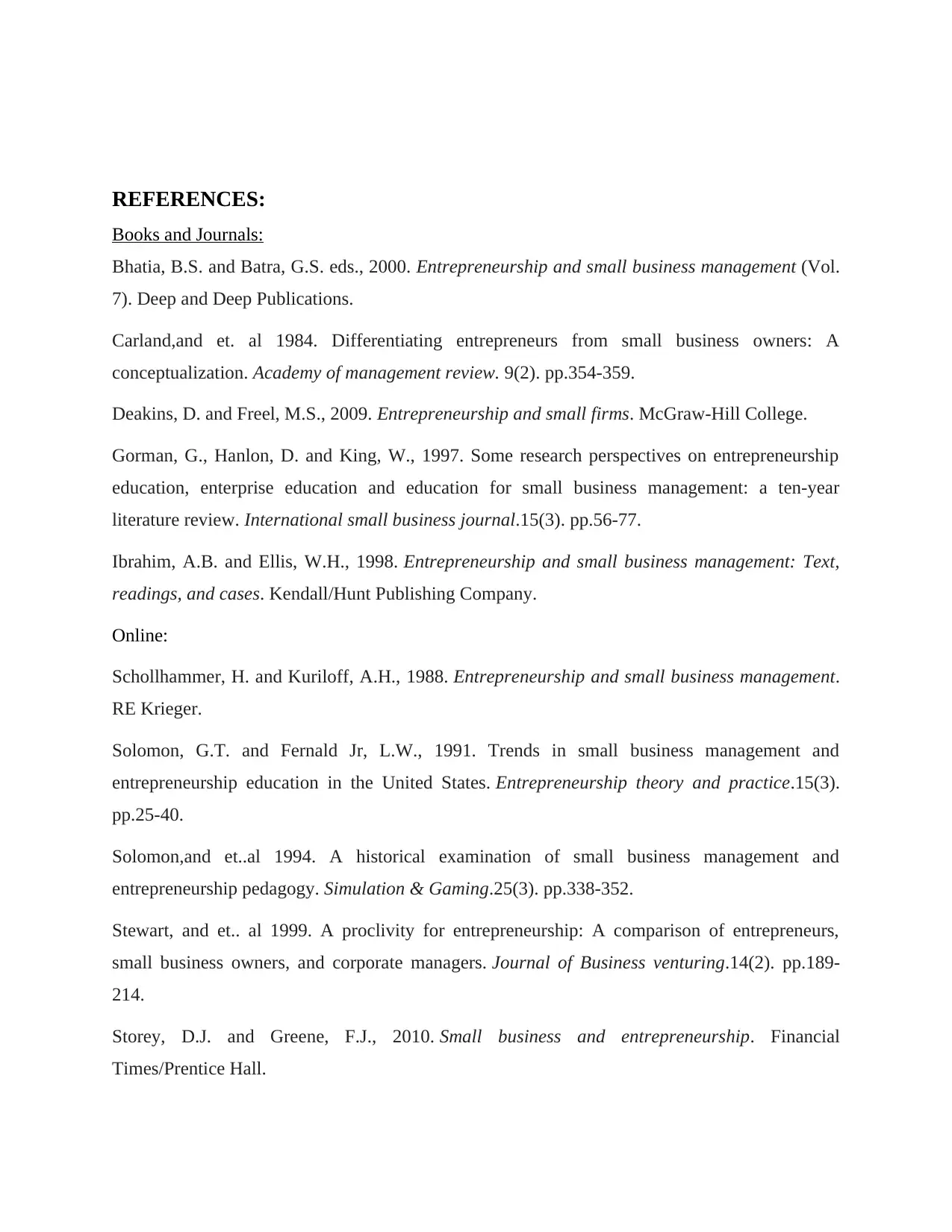
REFERENCES:
Books and Journals:
Bhatia, B.S. and Batra, G.S. eds., 2000. Entrepreneurship and small business management (Vol.
7). Deep and Deep Publications.
Carland,and et. al 1984. Differentiating entrepreneurs from small business owners: A
conceptualization. Academy of management review. 9(2). pp.354-359.
Deakins, D. and Freel, M.S., 2009. Entrepreneurship and small firms. McGraw-Hill College.
Gorman, G., Hanlon, D. and King, W., 1997. Some research perspectives on entrepreneurship
education, enterprise education and education for small business management: a ten-year
literature review. International small business journal.15(3). pp.56-77.
Ibrahim, A.B. and Ellis, W.H., 1998. Entrepreneurship and small business management: Text,
readings, and cases. Kendall/Hunt Publishing Company.
Online:
Schollhammer, H. and Kuriloff, A.H., 1988. Entrepreneurship and small business management.
RE Krieger.
Solomon, G.T. and Fernald Jr, L.W., 1991. Trends in small business management and
entrepreneurship education in the United States. Entrepreneurship theory and practice.15(3).
pp.25-40.
Solomon,and et..al 1994. A historical examination of small business management and
entrepreneurship pedagogy. Simulation & Gaming.25(3). pp.338-352.
Stewart, and et.. al 1999. A proclivity for entrepreneurship: A comparison of entrepreneurs,
small business owners, and corporate managers. Journal of Business venturing.14(2). pp.189-
214.
Storey, D.J. and Greene, F.J., 2010. Small business and entrepreneurship. Financial
Times/Prentice Hall.
Books and Journals:
Bhatia, B.S. and Batra, G.S. eds., 2000. Entrepreneurship and small business management (Vol.
7). Deep and Deep Publications.
Carland,and et. al 1984. Differentiating entrepreneurs from small business owners: A
conceptualization. Academy of management review. 9(2). pp.354-359.
Deakins, D. and Freel, M.S., 2009. Entrepreneurship and small firms. McGraw-Hill College.
Gorman, G., Hanlon, D. and King, W., 1997. Some research perspectives on entrepreneurship
education, enterprise education and education for small business management: a ten-year
literature review. International small business journal.15(3). pp.56-77.
Ibrahim, A.B. and Ellis, W.H., 1998. Entrepreneurship and small business management: Text,
readings, and cases. Kendall/Hunt Publishing Company.
Online:
Schollhammer, H. and Kuriloff, A.H., 1988. Entrepreneurship and small business management.
RE Krieger.
Solomon, G.T. and Fernald Jr, L.W., 1991. Trends in small business management and
entrepreneurship education in the United States. Entrepreneurship theory and practice.15(3).
pp.25-40.
Solomon,and et..al 1994. A historical examination of small business management and
entrepreneurship pedagogy. Simulation & Gaming.25(3). pp.338-352.
Stewart, and et.. al 1999. A proclivity for entrepreneurship: A comparison of entrepreneurs,
small business owners, and corporate managers. Journal of Business venturing.14(2). pp.189-
214.
Storey, D.J. and Greene, F.J., 2010. Small business and entrepreneurship. Financial
Times/Prentice Hall.
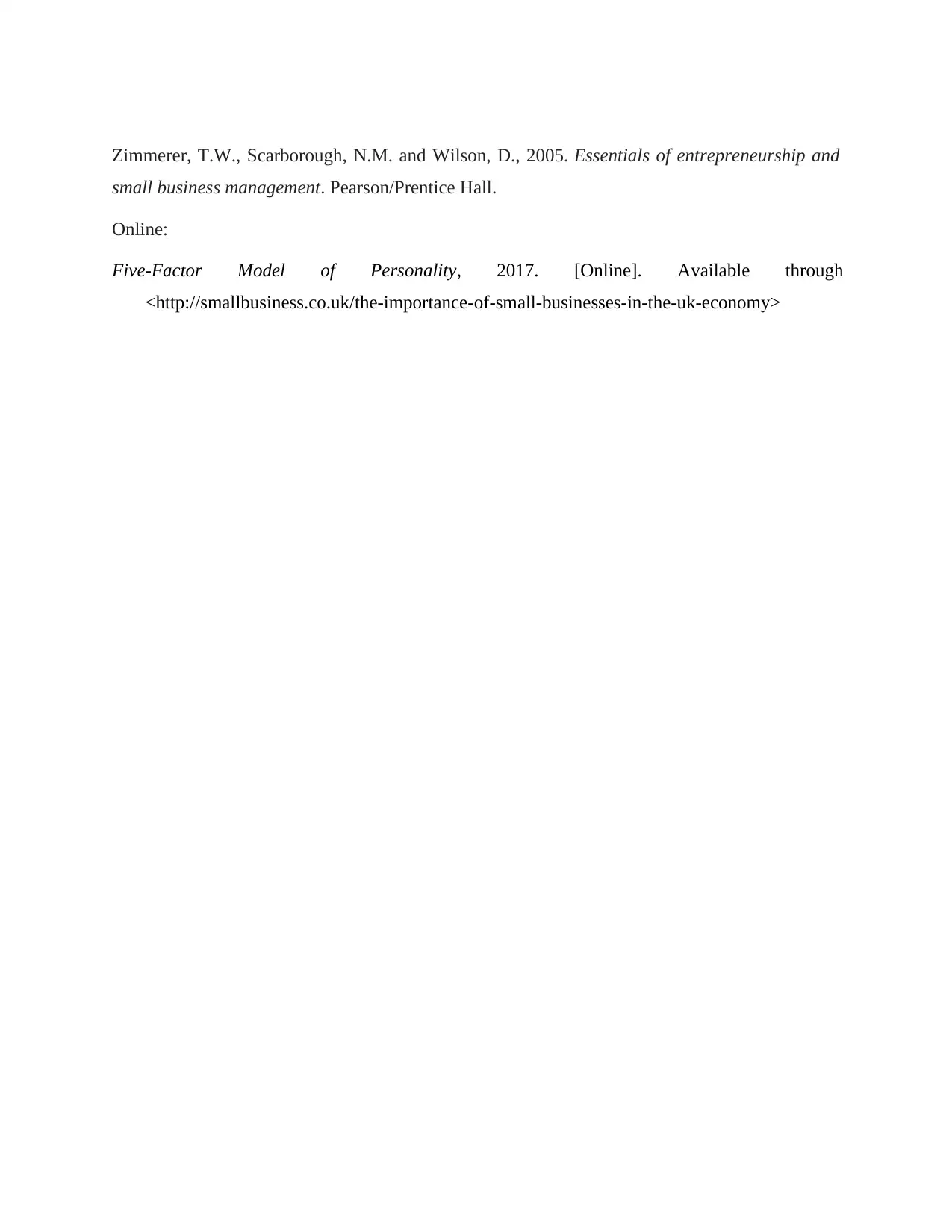
Zimmerer, T.W., Scarborough, N.M. and Wilson, D., 2005. Essentials of entrepreneurship and
small business management. Pearson/Prentice Hall.
Online:
Five-Factor Model of Personality, 2017. [Online]. Available through
<http://smallbusiness.co.uk/the-importance-of-small-businesses-in-the-uk-economy>
small business management. Pearson/Prentice Hall.
Online:
Five-Factor Model of Personality, 2017. [Online]. Available through
<http://smallbusiness.co.uk/the-importance-of-small-businesses-in-the-uk-economy>
1 out of 16
Related Documents
Your All-in-One AI-Powered Toolkit for Academic Success.
+13062052269
info@desklib.com
Available 24*7 on WhatsApp / Email
![[object Object]](/_next/static/media/star-bottom.7253800d.svg)
Unlock your academic potential
© 2024 | Zucol Services PVT LTD | All rights reserved.





